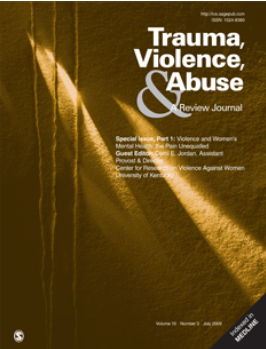儿童虐待与复杂创伤后应激障碍:系统文献综述。
IF 5.4
1区 社会学
Q1 CRIMINOLOGY & PENOLOGY
引用次数: 0
摘要
有确凿的证据表明,儿童虐待与复杂创伤后应激障碍(C-PTSD)有关,尽管其潜在机制尚不明确。本研究旨在系统回顾实证研究,探讨儿童虐待与C-PTSD之间的潜在心理因素以及文献空白。根据系统评价和荟萃分析方案的首选报告项目,我们分析了19项原始研究,共n = 1,075名受试者。(a)情绪处理是指情绪的接近、接受、符号化、容忍、调节、意义化、利用或转化;(b)个人因素(intrpersonal Factors):描述在个人内部运作或产生的因素,如态度、决定、自我概念、自尊或自我调节;(c)人际因素是影响个人如何相互交往的因素,包括个人特征和交流动态;(d)分离,这是一种防御机制,在这种机制中,相互冲突的冲动被分开,威胁的想法和感觉与心理的其他部分分开;(e)社会因素是影响社会环境中思想或行为的因素(如态度),或影响对-à-vis其他个人或群体的自我概念的因素。需要进一步的研究来检验针对这些介质在多大程度上可能作为支持个人从童年虐待中康复的改变机制。本文章由计算机程序翻译,如有差异,请以英文原文为准。
Childhood Maltreatment and Complex PTSD: A Systematic Literature Review.
There is established evidence that childhood maltreatment is associated with Complex Posttraumatic Stress Disorder (C-PTSD), although the underlying mechanisms are not still precise. The current study aimed to systematically review empirical studies examining potential psychological factors linking childhood maltreatment to C-PTSD and the gaps in the literature. Following the Preferred Reporting Items for Systematic reviews and Meta-Analyses protocol, 19 original studies with a total of n = 1,075 subjects were analyzed. Five mediating processes were identified: (a) Emotional Processing as approaching, accepting, symbolizing, tolerating, regulating, making meaning of, and utilizing or transforming emotions; (b) Intrapersonal Factors describing factors operating or constructs occurring within the person, such as attitudes, decisions, self-concept, self-esteem, or self-regulation; (c) Interpersonal Factors are elements that shape how individuals engage with each other, including personal characteristics, and communication dynamic; (d) Dissociation that is a defense mechanism in which conflicting impulses are kept apart or threatening ideas and feelings are separated from the rest of the psych; and (e) Social Factors are factors (e.g., attitudes) that affect thought or behavior in social contexts or that affect self-concept vis-à-vis other individuals or groups. Further research is required to examine the extent to which targeting these mediators may act as mechanisms for change in supporting individuals to heal from childhood maltreatment.
求助全文
通过发布文献求助,成功后即可免费获取论文全文。
去求助
来源期刊

Trauma Violence & Abuse
Multiple-
CiteScore
13.60
自引率
7.80%
发文量
131
期刊介绍:
Trauma, Violence, & Abuse is devoted to organizing, synthesizing, and expanding knowledge on all force of trauma, abuse, and violence. This peer-reviewed journal is practitioner oriented and will publish only reviews of research, conceptual or theoretical articles, and law review articles. Trauma, Violence, & Abuse is dedicated to professionals and advanced students in clinical training who work with any form of trauma, abuse, and violence. It is intended to compile knowledge that clearly affects practice, policy, and research.
 求助内容:
求助内容: 应助结果提醒方式:
应助结果提醒方式:


